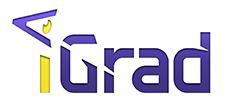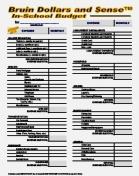
Money and you - do you manage it or does it manage you? As a student, managing your money can be a challenge. This may be your first time handling monthly household expenses and recurring bills. Successfully dealing with life on the limited financial resources of a student means wise planning and careful spending. With this in mind, check out the information provided below and use it to help you better manage your finances.
Financial Literacy
The mission of the UCLA Financial Wellness is to empower all Bruins to confidently navigate their finances in a way that supports their overall well-being. It fosters financial literacy skills via workshops, coaching and online education. Additionally, the program encourages students to know who, when and why to ask for help. For more information, visit Financial Wellness.

Financial literacy courses created by iGrad are great tools for building a better understanding of matters related to finance and money. Just select the topics that you think will most benefit you at this point in your financial life. Some of the topics currently covered are:
• Financial Health
• Smart Spending
• Student Loans
• Banking
• Credit Cards
• Credit Reports
• Identity Theft
• Your Paycheck
• Investing
In addition, the iGrad website contains many article and videos related to the subject of money, career, lifestyle and education that you may find helpful as you make your way through your college days and beyond. (To begin a course, you will need to register with iGrad.)

Budgeting for Success
On the Mapping Your Future® website, there are a number of financial tools to help you in establishing a budget. Start exploring this and other related information by visiting their Manage Your Money page.

Bruin Dollars and $ense In-School Budget Form
Trying to keep a budget just inside your head usually leads to financial disaster. Developing the habit of creating an actual budget, on paper or in electronic form, is important. Such a budget, if done honestly, will give you the absolute answer to the question, "What happened to all of my money?" To get the answer regarding your money, fill out a Bruin Dollars and $ense In-School Budget Form each month and start using the information to your advantage.
It may be true that creating a budget will show you where your money goes, but it is not the whole picture when it comes to managing your finances. It's important to recognize your spending habits and understand 'true need' over a 'simple want'. To make budgeting bearable, a budget should be goal-oriented. Attaching a goal to your budgeting is much more motivating than simply crunching numbers. Ask yourself, "What are my goals? Does this financial decision work with my overall plan?" Remembering that 'sacrificing now, can lead to a desired goal later' lends purpose to your budgeting activity. Your budget is your way to the future.

Credit Cards & Credit
Under the Fair and Accurate Credit Transactions Act, you are entitled to a free annual credit report from each of three nationwide consumer credit reporting agencies. You can review these reports and monitor them for accounts open in your name, inquiries made by others concerning your credit, as well as indicators of possible identity theft. Go to Annual Credit Report to obtain the free reports. For further details on credit reports, check out the Review and Understand Your Credit Report webpage on the Mapping Your Future® website.
Don't get caught in the credit card trap - an outstanding balance that rolls over to the next month, month after month, incurring an interest charge on the previous months balance, a balance that also includes previously incurred interest charges. If you do charge, make it a practice to not charge more than you can pay off before your next bill. If you are not able to pay your bill in full each month, always pay more than the minimum. Pay off your highest interest rate credit accounts first. If you have a problem making a payment or with your credit in general, don't ignore it; seek help right away.
